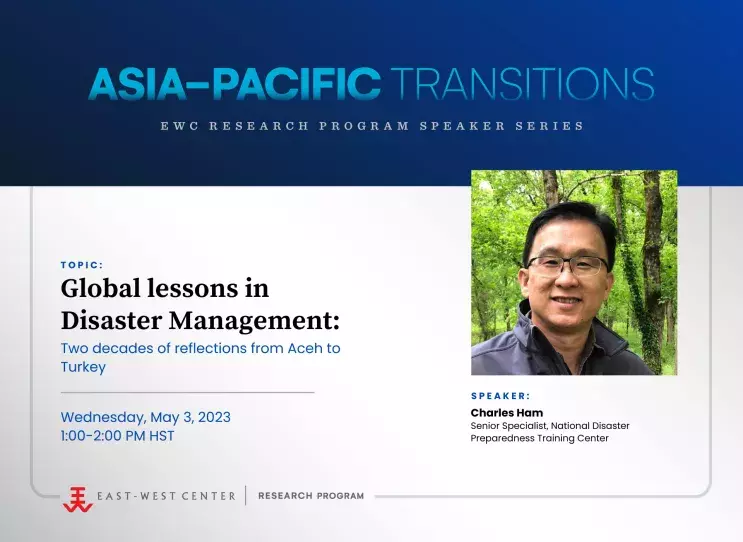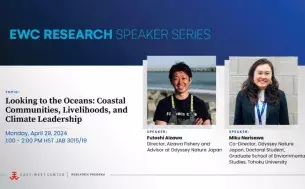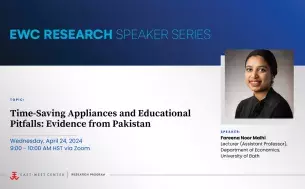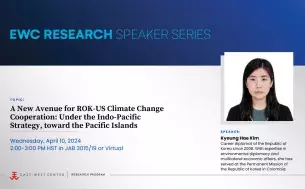Error message

OFFICE/DEPARTMENT
Asia-Pacific Transitions: EWC Research Program Speaker Series
Wednesday, May 3, 2023
1:00 - 2:00 p.m. HST
Global Lessons in Disaster Management: Two Decades of Reflections from Aceh to Turkey
featuring
Charles Ham, Senior Specialist, National Disaster Preparedness Training Center
Turkey’s devastating 2023 earthquake disaster reminded us once again of the profound vulnerabilities to natural disasters around the world, most apparent from the over 52,000 casualties and US$100 billion economic damages and losses. Since the catastrophic 2004 Indian Ocean Tsunami that included US$ 7.7 billion in reconstruction and recovery funds and became the largest humanitarian effort in history, much has changed in the approaches and overall global networks and infrastructure of disaster management. In the past two decades, 1.23 million people have died from natural disasters, with 4 billion people affected, and $2.97 trillion losses. With climate change and a global health crisis, disasters are becoming increasingly complex, with “cascading” effects of hazards layered within disaster events. This presentation reviews some of the lessons learned from on-the-ground experiences in response and recovery efforts working with communities, governments, international relief and United Nations agencies from around the world, including case study sites in Indonesia, Myanmar, Haiti, Philippines, Nepal, Guinea, Liberia, Sierra Leone, Japan, and Turkey. Disaster management efforts have made significant progress in the science and technology of preparedness, communications, and monitoring, but the social dimensions of vulnerability and marginalization continue to pose the biggest challenge in building resilience.
Charles Ham works with National Disaster Preparedness Training Center at the University of Hawai'i as senior specialist for INVEST DM project in supporting disaster management human capital development. His 27-year humanitarian and development experience include working with communities in the Asia Pacific (Indonesia, Malaysia, Singapore, Philippines, Thailand, Nepal, Myanmar, India, Bangladesh, Nepal, Cambodia, Japan, Papua New Guinea, Fiji) as well as Albania, Ukraine, Turkey, Greece, Italy, Germany, Haiti, and others. As a consultant, some of his partners include HOPE worldwide, Ford Foundation, Citi Foundation, Microsoft, Apple, and various UN agencies; also serving as a member in the Global Health Cluster led by WHO. Besides disaster risk management, Charles also brings experience in public health, education, non-profit management and capacity building. His past works include teacher training development, university capacity building, community-based preparedness & readiness, pandemic preparedness & response, psychosocial interventions, community-based malaria and tuberculosis programs, housing and education recovery, network and partnership development, and more. He received a bachelor’s degree in finance from Northern Illinois University, Master of Public Health from University of Massachusetts, and is currently on a doctoral study at the University of Hawai'i at Mānoa focusing on equity and resilience planning in small islands.
The views expressed are those of the speaker and do not necessarily reflect East-West Center policies or positions.
Asia-Pacific Transitions: EWC Research Program Speaker Series
Wednesday, May 3, 2023
1:00 - 2:00 p.m. HST
Global Lessons in Disaster Management: Two Decades of Reflections from Aceh to Turkey
featuring
Charles Ham, Senior Specialist, National Disaster Preparedness Training Center
Turkey’s devastating 2023 earthquake disaster reminded us once again of the profound vulnerabilities to natural disasters around the world, most apparent from the over 52,000 casualties and US$100 billion economic damages and losses. Since the catastrophic 2004 Indian Ocean Tsunami that included US$ 7.7 billion in reconstruction and recovery funds and became the largest humanitarian effort in history, much has changed in the approaches and overall global networks and infrastructure of disaster management. In the past two decades, 1.23 million people have died from natural disasters, with 4 billion people affected, and $2.97 trillion losses. With climate change and a global health crisis, disasters are becoming increasingly complex, with “cascading” effects of hazards layered within disaster events. This presentation reviews some of the lessons learned from on-the-ground experiences in response and recovery efforts working with communities, governments, international relief and United Nations agencies from around the world, including case study sites in Indonesia, Myanmar, Haiti, Philippines, Nepal, Guinea, Liberia, Sierra Leone, Japan, and Turkey. Disaster management efforts have made significant progress in the science and technology of preparedness, communications, and monitoring, but the social dimensions of vulnerability and marginalization continue to pose the biggest challenge in building resilience.
Charles Ham works with National Disaster Preparedness Training Center at the University of Hawai'i as senior specialist for INVEST DM project in supporting disaster management human capital development. His 27-year humanitarian and development experience include working with communities in the Asia Pacific (Indonesia, Malaysia, Singapore, Philippines, Thailand, Nepal, Myanmar, India, Bangladesh, Nepal, Cambodia, Japan, Papua New Guinea, Fiji) as well as Albania, Ukraine, Turkey, Greece, Italy, Germany, Haiti, and others. As a consultant, some of his partners include HOPE worldwide, Ford Foundation, Citi Foundation, Microsoft, Apple, and various UN agencies; also serving as a member in the Global Health Cluster led by WHO. Besides disaster risk management, Charles also brings experience in public health, education, non-profit management and capacity building. His past works include teacher training development, university capacity building, community-based preparedness & readiness, pandemic preparedness & response, psychosocial interventions, community-based malaria and tuberculosis programs, housing and education recovery, network and partnership development, and more. He received a bachelor’s degree in finance from Northern Illinois University, Master of Public Health from University of Massachusetts, and is currently on a doctoral study at the University of Hawai'i at Mānoa focusing on equity and resilience planning in small islands.
The views expressed are those of the speaker and do not necessarily reflect East-West Center policies or positions.









